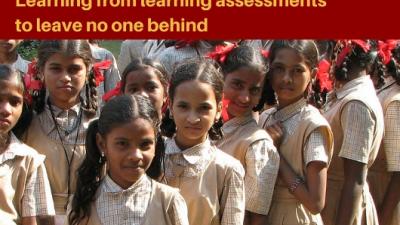
Young Lives lead education researcher, Caine Rolleston, will be presenting on Assement for Effectiveness and Equality and the REAL Centre conference on 'Learning from Learning Assessments to Leave No One Behind' on 15 June 2016. Download the presentation from Slideshare: Assessment for Effectiveness and Equity: Lessons from a Longitudinal Study
Background
Of the world’s 650 million primary school age children, 250 million are not learning even basic skills in reading and mathematics. World leaders have committed to overcome this ‘global learning crisis’ by ensuring inclusive and equitable quality education and promoting lifelong learning opportunities for all by 2030 (Education Sustainable Development Goal 4). The global goal focus on leaving no one behind is vital, with some evidence showing that inequalities in learning within countries are wider than inequalities across countries.
The aims of the event are threefold:
- to identify lessons for public policy using existing international and regional learning assessment data, with a focus on countries furthest from achieving global goals.
- to highlight innovations needed in learning assessment data, both in relation to the measurement of learning as well as different forms of disadvantage (notably poverty, gender and disability).
- to promote ways to ensure learning tools and data are publicly available, enabling researchers to maximise methodological rigour in the use of the data and widen the policy debate.
Draft programme
9.30-10.00 Registration and coffee
10.00-10.15 Welcome and opening remarks (Pauline Rose, Director of REAL Centre, University of Cambridge)
10.15-10.45 Opening keynote address: Why a data revolution is needed in education to leave no one behind (Kevin Watkins, Director, Overseas Development Institute)
10.45-12.30 Panel: Using learning data to inform public policy (Chair: Anna Vignoles, University of Cambridge)
- Justin Sandefur, Center for Global Development: Household wealth and test scores around the world
- Ricardo Sabates, University of Cambridge: Patterns of learning inequalities within countries: Lessons for public policy in low- and lower-middle-income countries
- John Jerrim, UCL Institute of Education: From PISA to policy and practice: learning from England
12.30-14.00 Lunch
14.00-15.30 Panel: Measurement and analysis to leave no one behind (Chair: Christopher Colclough, University of Cambridge)
- Paul Atherton, DFID: The importance of focusing on early literacy
- Monica Aslam, University of Oxford: Evaluation: More than an after-thought? India’s Activity-based Learning Programme
- Nidhi Singal, University of Cambridge: Including children with disabilities in the assessment of learning
15.30-17.00 Panel: New approaches to assessing learning to leave no one behind (Chair: Pablo Zoido, PISA for Development, OECD)
- Lucy Lake, Camfed: Assessing learning at secondary level: Lessons from Camfed’s experience
- Caine Rolleston: Young Lives/UCL Institute of Education: Assessment for effectiveness and equity: Lessons from a longitudinal study
- Luning Sun, University of Cambridge: New developments in assessing reasoning ability using open source approaches
17.00-17.30 Closing remarks: Lessons learned and next steps
- Chris Berry, DFID
- Mary Metcalfe, Open Society Foundations
- Michael Ward. PISA for development, OECD
- Pauline Rose, University of Cambridge
Further information from: https://www.educ.cam.ac.uk/centres/real/
Young Lives lead education researcher, Caine Rolleston, will be presenting on Assement for Effectiveness and Equality and the REAL Centre conference on 'Learning from Learning Assessments to Leave No One Behind' on 15 June 2016. Download the presentation from Slideshare: Assessment for Effectiveness and Equity: Lessons from a Longitudinal Study
Background
Of the world’s 650 million primary school age children, 250 million are not learning even basic skills in reading and mathematics. World leaders have committed to overcome this ‘global learning crisis’ by ensuring inclusive and equitable quality education and promoting lifelong learning opportunities for all by 2030 (Education Sustainable Development Goal 4). The global goal focus on leaving no one behind is vital, with some evidence showing that inequalities in learning within countries are wider than inequalities across countries.
The aims of the event are threefold:
- to identify lessons for public policy using existing international and regional learning assessment data, with a focus on countries furthest from achieving global goals.
- to highlight innovations needed in learning assessment data, both in relation to the measurement of learning as well as different forms of disadvantage (notably poverty, gender and disability).
- to promote ways to ensure learning tools and data are publicly available, enabling researchers to maximise methodological rigour in the use of the data and widen the policy debate.
Draft programme
9.30-10.00 Registration and coffee
10.00-10.15 Welcome and opening remarks (Pauline Rose, Director of REAL Centre, University of Cambridge)
10.15-10.45 Opening keynote address: Why a data revolution is needed in education to leave no one behind (Kevin Watkins, Director, Overseas Development Institute)
10.45-12.30 Panel: Using learning data to inform public policy (Chair: Anna Vignoles, University of Cambridge)
- Justin Sandefur, Center for Global Development: Household wealth and test scores around the world
- Ricardo Sabates, University of Cambridge: Patterns of learning inequalities within countries: Lessons for public policy in low- and lower-middle-income countries
- John Jerrim, UCL Institute of Education: From PISA to policy and practice: learning from England
12.30-14.00 Lunch
14.00-15.30 Panel: Measurement and analysis to leave no one behind (Chair: Christopher Colclough, University of Cambridge)
- Paul Atherton, DFID: The importance of focusing on early literacy
- Monica Aslam, University of Oxford: Evaluation: More than an after-thought? India’s Activity-based Learning Programme
- Nidhi Singal, University of Cambridge: Including children with disabilities in the assessment of learning
15.30-17.00 Panel: New approaches to assessing learning to leave no one behind (Chair: Pablo Zoido, PISA for Development, OECD)
- Lucy Lake, Camfed: Assessing learning at secondary level: Lessons from Camfed’s experience
- Caine Rolleston: Young Lives/UCL Institute of Education: Assessment for effectiveness and equity: Lessons from a longitudinal study
- Luning Sun, University of Cambridge: New developments in assessing reasoning ability using open source approaches
17.00-17.30 Closing remarks: Lessons learned and next steps
- Chris Berry, DFID
- Mary Metcalfe, Open Society Foundations
- Michael Ward. PISA for development, OECD
- Pauline Rose, University of Cambridge
Further information from: https://www.educ.cam.ac.uk/centres/real/


